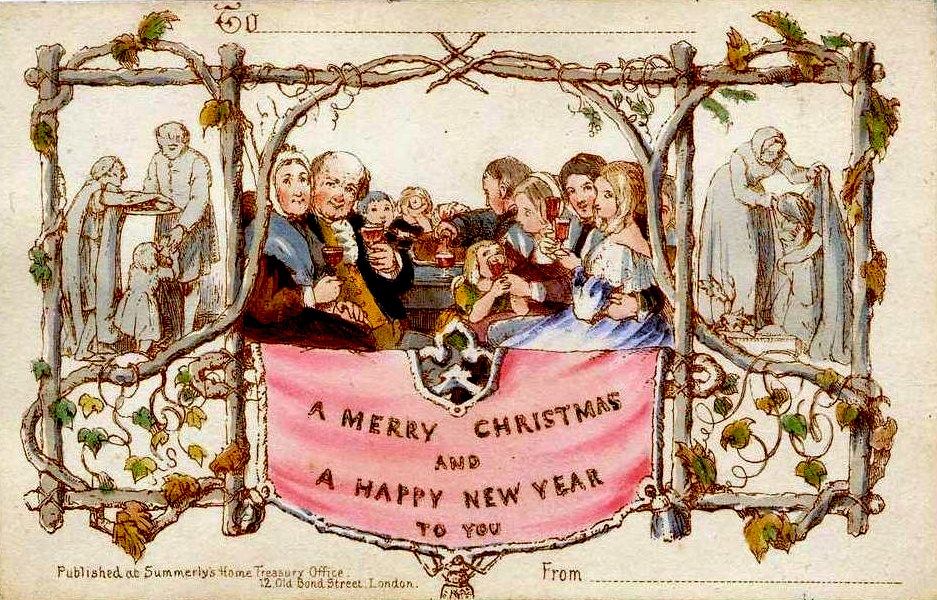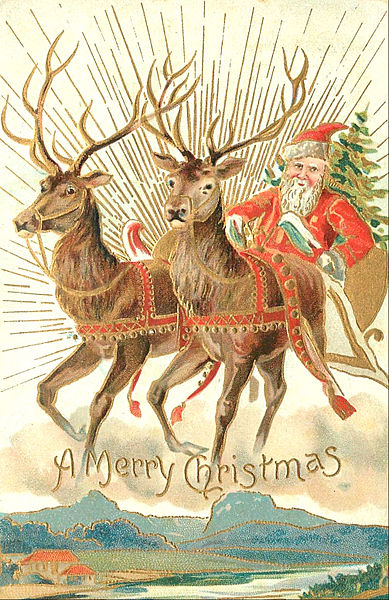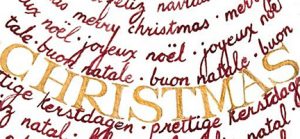Why do we say Merry Christmas?
Merry Christmas Origin and History
These days, it’s common practice to wish “Merry Christmas” to one another around the 25th of December, the day of Christmas. The origin of this practice is a little obscure. However, it’s believed that an English admiral first used the term Merry Christmas in an informal letter, way back in 1699. In the same era, the phrase was used in non-relgious Christmas song ‘We wish you a Merry Christmas’, which is still popular today.
In 1843, Charles Dickens used the same phrase in “A Christmas Carol.” also in 1843 the first ever Christmas Card was produced for purchase, which contained the saying! It was a perfect storm of popularity for “Merry Christmas” and the phrase became an instant hit for Christmas Greetings all around the world!
History of the Phrase Merry Christmas

Above, the first ever commercially produced Christmas Card, which is still a very popular tradition. Modern cards offer a variety of holiday greetings.
Merry Christmas Meaning
What Does it Mean?
The term Merry is used instead of Happy originally to denote the merrymaking of the holiday, like in the classic Christmas Carol ‘God Rest Ye Merry Gentlemen’. Merry Christmas reflects that messages of love, joy and well wishes can be communicated irrespective of belief systems. It’s a greeting that makes total strangers make instant connection.
What is a Merry Christmas?
It’s a message that dissolves anger. It’s a message that evaporates misunderstanding between loved ones and creates a bridge to the beginning of a new relationship. It’s amazing that these two simple words “Merry Christmas” can have this profound effect.
Merry Christmas vs Happy Holidays
Notwithstanding the veracity of its origin, “Merry Christmas” has become a sort of universal term to communicate joy and good wishes. While in recent years the term Happy Holidays has become more popular as well, feeling that there would be more inclusion of other cultures way to celebrate their own Holidays in December. Although Happy Holidays has always been associated with Christmas as well as Seasons Greetings to share your holiday wishes. The term Merry Christmas doesn’t need have any religious bias and is often used by people of all races and religious backgrounds, during Christmas time.
Happy Christmas?
In some places, people use a slight variation of the term “Merry Christmas.” In Ireland and Great Britain, some people prefer using “Happy Christmas” instead. However, the power and significance of the phrase is not diminished at all because of a difference in phraseology, because the intent of love and well being remains the same, no matter which phrase is used.
Happy Christmas
The phrase “Happy Christmas” is often used by Queen Elizabeth II of Great Britain and continues to gain popularity in that part of the world. In fact, in the concluding lines of his now famous “A visit from St. Nicholas”, Clement Moore actually used “Happy Christmas.”

There are many holiday greeting terms used across the world. But “Merry Christmas” remains a very popular term in countries with large Christian population, like the United States, Great Britain, Canada and Australia. Other terms that are used around the same time of the year as a means of greeting are “Happy holidays”, “Seasons Greetings” and, of course, “Happy Christmas.”
The fact remains that no matter what term you use, it’s the intent that matters. Use of words is merely an audible method of sending a message. Words have no meaning in themselves, other than the one perceived by the person who hears it. And when we are using something like “Merry Christmas”, is there any doubt about our intentions?

Learn to say Merry Christmas in Other Languages
Do you prefer Happy Christmas, Merry Christmas, or Happy Holidays?




I prefer “Happy Christmas”. If you believe Christmas is centered around Christ’s Birth, it only makes sense. If you were to meet Christ on Christmas would you say “Merry Birthday”?